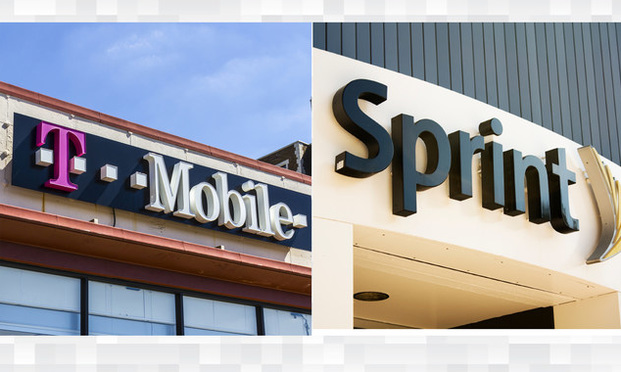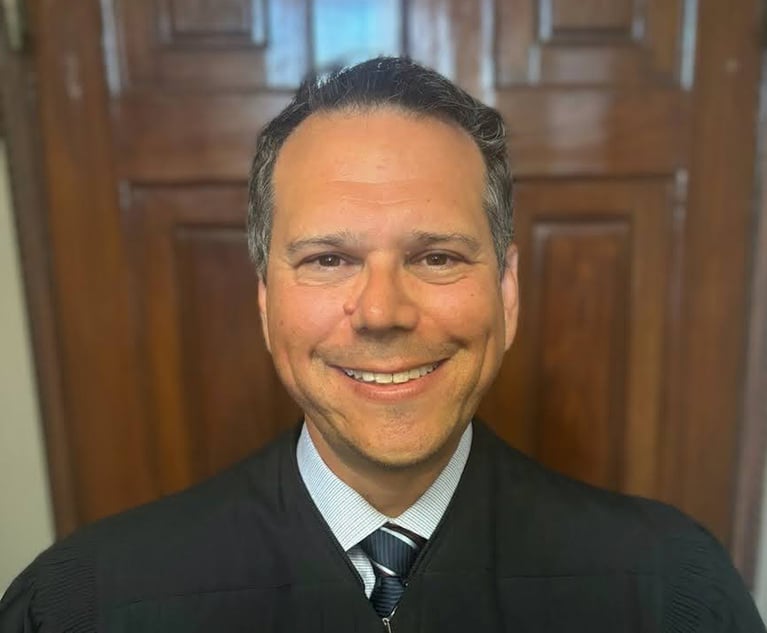Daily Dicta: Get Ready for the Next Antitrust Mega-Fight (Hint: It Doesn't Involve DOJ)
It's not just nature that abhors a vacuum. So too does regulatory enforcement. And the fight to watch this fall will pit AGs from more than a dozen states against lawyers for T-Mobile and Sprint.
July 30, 2019 at 01:01 PM
5 minute read
 T Mobile and Sprint Composite.
T Mobile and Sprint Composite.
Here's a funny thing about the Justice Department's Antitrust Division these days.
When a merger involves an entity the president openly despises—cough, CNN—antitrust enforcers are all about super-aggressive enforcement, bringing (and losing) the first challenge to a vertical merger since the Carter administration.
Or take Google and Facebook—which President Trump has blasted for their alleged anti-conservative bias—as well as Amazon, which is owned by Trump nemesis Jeff Bezos. Last week, Antitrust Division head Makan Delrahim announced a wide-ranging review of “market-leading online platforms” that's virtually certain to put the trio on the hot seat as calls mount for their breakups.
But when it comes to the merger of T-Mobile and Sprint—politically neutral companies that have not found themselves in the president's crosshairs?
Their union raises classic antitrust concerns, combining the third and fourth largest players in a highly-concentrated market. Based on the government's own guidelines, it's presumptively anticompetitive because it sends the Herfindahl-Hirschman Index, which measures market concentration, soaring. Estimates by economists for Sprint and T-Mobile allegedly show that the merger could cost the companies' subscribers at least $4.5 billion annually.
 And the erstwhile diligent Trump antitrust enforcers' response?
And the erstwhile diligent Trump antitrust enforcers' response?
Meh. Make some divestitures to Dish Network and you're good to go.
Never let anyone claim antitrust isn't political.
But it's not just nature that abhors a vacuum. Apparently so too does regulatory enforcement.
That's why the fight to watch this fall will pit AGs from 13 states plus the District of Columbia along with outside counsel for California from Munger, Tolles & Olson against lawyers for T-Mobile and Sprint.
The states filed suit in U.S. District Court for the Southern District of New York in June to block the $26.5 billion merger—a challenge that took center stage after the DOJ greenlighted the deal on Friday. (The Federal Communication Commission has yet to formally approve the transaction, but the three Republican commissioners have expressed their support—enough to outvote the Democrats.)
The wireless carriers have assembled a formidable defense team. Cleary Gottlieb Steen & Hamilton partners George Cary, Dave Gelfand and Mark Nelson are taking the lead for both T-Mobile and Deutsche Telekom.
Cary, who was named a Dealmaker of the Year by The American Lawyer in 2018 for his role as lead antitrust counsel to Dow Chemical in its $130 billion merger with DuPont, is a seasoned antitrust counselor. Gelfand has high-level government experience, serving from 2013 to 2016 as the deputy assistant attorney general for litigation in DOJ's Antitrust Division, while Nelson has worked on a wide range of antitrust matters.
In addition, Deutsche Telekom has tapped Gibson, Dunn & Crutcher's Richard Parker, who has extensive antitrust trial experience, including Sysco/ U.S. Foods and Triton Coal/ Arch Coal. Also on the team: Joshua Soven of Wilson Sonsini Goodrich & Rosati, who preceded Gelfand as the DOJ's Antitrust Division litigation chief, serving from 2007 to 2012.
T-Mobile has also retained commercial litigator Hallie Levin of Wilmer Cutler Pickering Hale and Dorr.
As for Sprint, it has turned to counsel from Skadden, Arps, Slate, Meagher & Flom led by antitrust practice head Steven Sunshine, another giant in the field.
Morrison & Foerster lawyers including David Meyer represent Sprint and its controlling shareholder Softbank Group Corp. Meyer joined the firm in 2009 from the Antitrust Division, where he was a senior official, responsible for matters including the XM-Sirius merger and Monsanto's acquisition of Delta.
It's a stellar team—but they'll have their work cut out for them.
In addition to the state AGs, defense counsel will face Munger Tolles lawyers led by Glenn Pomerantz. In 2011, Pomerantz temporarily resigned from the firm to join the Justice Department, where he was co-lead trial counsel in the government's successful suit blocking AT&T's attempt to merge with T-Mobile. This assignment should be familiar turf for him.
That's not all. The merger is also of keen interest to T-Mobile and Sprint competitors, which have joined in on the side of the state AGs as movants.
Per the docket, Comcast has tapped Arthur Burke, who heads the antitrust practice at Davis Polk & Wardwell.
Charter Communications Inc. is represented by Mark Popofsky of Ropes & Gray—a DOJ veteran who played a key role in U.S. v. Microsoft and now leads the firm's antitrust group.
Altice USA Inc. has turned to Paul Weiss litigation leader Jay Cohen, along with Jonathan Kanter, who co-heads the firm's antitrust practice.
AT&T has called on Crowell & Moring's Olivier Antoine, who recently represented the company in its $108.7 billion acquisition of Time Warner Inc. as well as its attempted acquisition of T-Mobile.
Trial is scheduled to begin on October 7, 2019 before U.S. District Judge Victor Marrero in Manhattan.
This content has been archived. It is available through our partners, LexisNexis® and Bloomberg Law.
To view this content, please continue to their sites.
Not a Lexis Subscriber?
Subscribe Now
Not a Bloomberg Law Subscriber?
Subscribe Now
NOT FOR REPRINT
© 2025 ALM Global, LLC, All Rights Reserved. Request academic re-use from www.copyright.com. All other uses, submit a request to [email protected]. For more information visit Asset & Logo Licensing.
You Might Like
View All
Litigators of the Week: Simpson Thacher and ACLU Team To Challenge Louisiana's Ten Commandments Law

A Reporter and a Mayor: Behind the Scenes During the Eric Adams Indictment News Cycle

Even With New Business Courts, Texas Is a Long Way from Taking Delaware's Corporate Law Mantle
5 minute read
Trending Stories
- 1From Hospital Bed to Legal Insights: Lessons in Life, Law, and Lawyering
- 2‘Diminishing Returns’: Is the Superstar Supreme Court Lawyer Overvalued?
- 3LinkedIn Accused of Sharing LinkedIn Learning Video Data With Meta
- 4Delaware Supreme Court Agrees Insurance Dispute Can Be Retried
- 5New Strategies For Estate, Legacy Planning
Who Got The Work
J. Brugh Lower of Gibbons has entered an appearance for industrial equipment supplier Devco Corporation in a pending trademark infringement lawsuit. The suit, accusing the defendant of selling knock-off Graco products, was filed Dec. 18 in New Jersey District Court by Rivkin Radler on behalf of Graco Inc. and Graco Minnesota. The case, assigned to U.S. District Judge Zahid N. Quraishi, is 3:24-cv-11294, Graco Inc. et al v. Devco Corporation.
Who Got The Work
Rebecca Maller-Stein and Kent A. Yalowitz of Arnold & Porter Kaye Scholer have entered their appearances for Hanaco Venture Capital and its executives, Lior Prosor and David Frankel, in a pending securities lawsuit. The action, filed on Dec. 24 in New York Southern District Court by Zell, Aron & Co. on behalf of Goldeneye Advisors, accuses the defendants of negligently and fraudulently managing the plaintiff's $1 million investment. The case, assigned to U.S. District Judge Vernon S. Broderick, is 1:24-cv-09918, Goldeneye Advisors, LLC v. Hanaco Venture Capital, Ltd. et al.
Who Got The Work
Attorneys from A&O Shearman has stepped in as defense counsel for Toronto-Dominion Bank and other defendants in a pending securities class action. The suit, filed Dec. 11 in New York Southern District Court by Bleichmar Fonti & Auld, accuses the defendants of concealing the bank's 'pervasive' deficiencies in regards to its compliance with the Bank Secrecy Act and the quality of its anti-money laundering controls. The case, assigned to U.S. District Judge Arun Subramanian, is 1:24-cv-09445, Gonzalez v. The Toronto-Dominion Bank et al.
Who Got The Work
Crown Castle International, a Pennsylvania company providing shared communications infrastructure, has turned to Luke D. Wolf of Gordon Rees Scully Mansukhani to fend off a pending breach-of-contract lawsuit. The court action, filed Nov. 25 in Michigan Eastern District Court by Hooper Hathaway PC on behalf of The Town Residences LLC, accuses Crown Castle of failing to transfer approximately $30,000 in utility payments from T-Mobile in breach of a roof-top lease and assignment agreement. The case, assigned to U.S. District Judge Susan K. Declercq, is 2:24-cv-13131, The Town Residences LLC v. T-Mobile US, Inc. et al.
Who Got The Work
Wilfred P. Coronato and Daniel M. Schwartz of McCarter & English have stepped in as defense counsel to Electrolux Home Products Inc. in a pending product liability lawsuit. The court action, filed Nov. 26 in New York Eastern District Court by Poulos Lopiccolo PC and Nagel Rice LLP on behalf of David Stern, alleges that the defendant's refrigerators’ drawers and shelving repeatedly break and fall apart within months after purchase. The case, assigned to U.S. District Judge Joan M. Azrack, is 2:24-cv-08204, Stern v. Electrolux Home Products, Inc.
Featured Firms
Law Offices of Gary Martin Hays & Associates, P.C.
(470) 294-1674
Law Offices of Mark E. Salomone
(857) 444-6468
Smith & Hassler
(713) 739-1250






